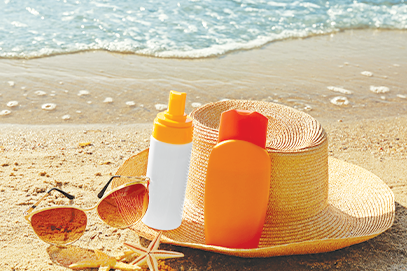Essential UV Protection Tips for Summer
July 26, 2024
Last year, July 2023 recorded the hottest day on Earth, and experts predict similar scorching temperatures for summer 2024. As we face another record-breaking season, it's important to prioritize sun safety and heat illness prevention. This UV Safety Awareness Month, learn to protect yourself from the heat and stay cool and hydrated.
Best Four Ways to Prevent Sunburn

With global temperatures on the rise, sun safety has never been more critical. Summer often means people spend more time outdoors, potentially exposing themselves to dangerous levels of UV radiation. This can lead to sunburn, premature aging and an increased risk of skin cancer.
To safeguard your skin, follow these four essential sun protection strategies:
- Apply (and reapply) sunblock: Use a broad-spectrum sunscreen with an SPF of at least 30. Apply generously 15-30 minutes before sun exposure and reapply every two hours or after swimming or sweating.
- Seek shade: Especially during peak UV hours (10 am – 4 pm), find shelter under trees, umbrellas or structures.
- Wear sun-protective clothing: Choose long-sleeved shirts, long pants and wide-brimmed hats. Look for clothing with a high Ultraviolet Protection Factor (UPF).
- Don't forget your eyes: Wear sunglasses that block both UVA and UVB rays to protect your eyes and the delicate skin around them.
Beating the Heat: Preventing Heat-Related Illnesses
As temperatures climb, so does the risk of heat-related illnesses like heat exhaustion and heat stroke. Prevention is critical when it comes to heat illnesses. Staying hydrated and avoiding overexertion in hot weather can make a significant difference.
Follow these tips to stay cool and prevent heat stroke:
- Stay hydrated: Drink plenty of water and whole fruits and veggies throughout the day, even if you don't feel thirsty. Avoid alcohol, excessive caffeine, and sugary drinks, which can contribute to dehydration.
- Dress appropriately: Wear lightweight, loose-fitting, light-colored clothing that reflects heat and allows your skin to breathe.
- Plan outdoor activities wisely: Schedule outdoor activities for cooler parts of the day, such as early morning or evening.
- Take frequent breaks: If you must be outside during hot weather, take regular breaks in cool or air-conditioned spaces.
- Never leave children or pets in cars: Even with the windows cracked, temperatures inside a vehicle can reach dangerous levels within minutes.
Recognizing the Signs of Heat Illness
Knowing the symptoms of heat-related illnesses can help you act quickly if you or someone around you is affected. Watch for:
- Cold, pale and clammy skin
- Dizziness
- Fainting
- Fast, weak pulse
- Headache
- Heavy sweating
- Muscle cramps
- Nausea or vomiting
- Tiredness or weakness
If you notice these symptoms, move to a cool place, loosen clothing, sip water and apply cool, wet cloths to the body.
If symptoms persist or worsen, seek medical attention immediately.
Hydration: Your Best Defense Against the Heat
Proper hydration is crucial for regulating body temperature and preventing heat-related illnesses. You should drink at least 8-10 glasses of water per day, and more if you're active or in hot conditions. Don't wait until you feel thirsty – you're already mildly dehydrated by then.
Here are some tips to help you stay hydrated as the summer heats up:
- Avoid sugary drinks, which can increase dehydration
- Carry a reusable water bottle and refill it throughout the day
- Eat water-rich fruits and vegetables like watermelon, cucumbers and strawberries
- Set reminders on your phone to drink water regularly
The Dangers of Sun Exposure and the Importance of Skin Checks
Enjoying the outdoors is an essential part of a healthy lifestyle. But, it's crucial to understand the risks associated with excessive sun exposure and the importance of regular skin checks.
The Link Between Sun Exposure and Skin Cancer
Prolonged and unprotected exposure to UV radiation can lead to various types of skin cancer, including:
- Basal cell carcinoma
- Squamous cell carcinoma
- Melanoma (the most dangerous form)
It's important to note that skin damage from UV radiation can build up over your lifetime. This means that even if you don't burn easily, your skin is still susceptible to long-term damage from sun exposure.
The Importance of Regular Skin Checks
Early detection is the key to successfully treating skin cancer. Regular self-examinations and professional skin checks can help identify potential issues before they become more serious.
Remember, sun protection is important year-round, not just during summer months. UV rays can penetrate clouds and reflect off surfaces like snow and water, increasing your exposure.
By understanding the risks of sun exposure and implementing regular skin checks into your health routine, you can enjoy the outdoors safely while minimizing your risk of skin cancer.
Sun safety and heat illness prevention are essential for enjoying the season safely. Following these tips and staying informed can protect yourself and your loved ones from harmful UV rays and heat-related health risks.
Stay cool, stay safe and enjoy your summer!

